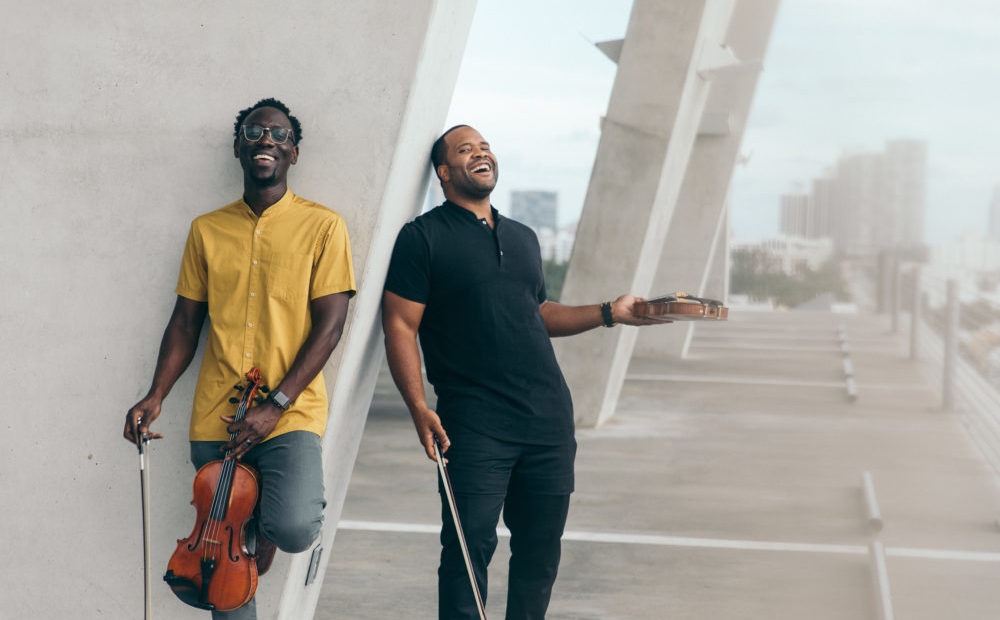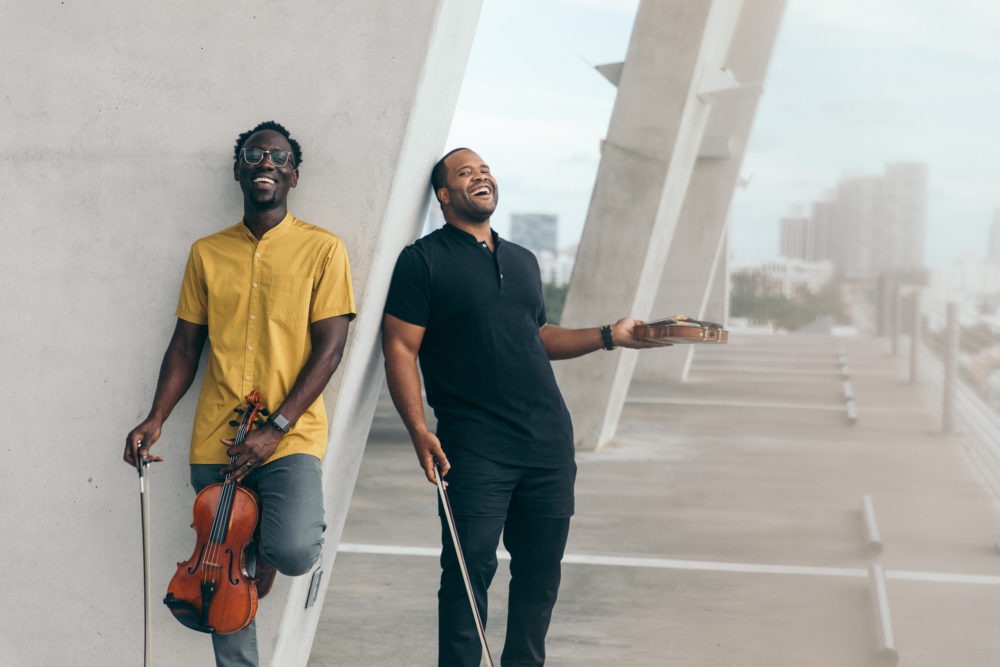
Duo ‘Black Violin’ Meshes Hip Hop With Classical Music
LISTEN
BY LISA MULLINS / HERE & NOW
When violinist Kev Marcus and violist Wil B met on the first day of their high school orchestra class, they decided to take the classical music they were learning to the next level.
“It was as always just completely classical, classical, classical, classical, classical,” Marcus says. “We started experimenting and finding our own voice … and that’s why we still play, because every time we pick up the instrument, it truly is like an extension of ourselves instead of us reading Bach or Beethoven.”

Wil B, left, and Kev Marcus make up hip-hop duo Black Violin. Their new album is called “Take The Stairs.” CREDIT: Mark Clennon
The classicly trained duo — whose real names are Kevin Sylvester and Wilner Baptist — formed Black Violin and found their unique sound mashing together Bach with Biggie Smalls.
These former classmates turned musical sensations are touring across the U.S., playing music that embraces different genres and appeals to all ages. Their new album, “Take The Stairs,” blends classical music with genres like hip-hop, rock and pop.
“Black Violin is like this nice, really wholesome bowl of gumbo with a lot of different ingredients,” B says. “It’s big. It’s beautiful. It’s everything. You can’t really put it in the box.”
They also started The Black Violin Foundation, a nonprofit that helps young musicians break stereotypes of any kind.
Beyond breaking classical music stereotypes with their music, the duo also aims to inspire kids to pursue careers in the arts.
“For me, my favorite part of playing this instrument is that I’m not supposed to do it,” Marcus says. “At the end of [the show], they’re buying a CD and they’re thinking, ‘Man, I didn’t think that the violin could do that. I didn’t think a big black dude could play a violin like that.’”
Interview Highlights
On becoming a mentor
Wil B: “I think it’s because just naturally, kids gravitate to us in a way that it’s kind of like Spider-Man: With great power comes great responsibility. And we feel like we can’t squander this power that we have. When we bring the kids on stage, as much as they’re inspired and they’re uplifted and they have a great time, we love it as well. We have a great time performing with them. And it’s amazing to be able to do something that you love and at the same time, you’re able to uplift and inspire. And that’s our way of giving back and that’s our way of trying to make sure that the arts are fought for in our society or whatever. And that’s kind of why we really went hard on this on this foundation. We just launched it. It’s really just an extension of what it is that we already do.”
On Black Violin’s cover of Pyotr Ilyich Tchaikovsky’s “Serenade for Strings”
Kev Marcus: “What we did is we took a recording of it and then we created a beat that basically felt as if the conductor is conducting a beat machine. So it’s the first time we felt like we were able to put classical and hip-hop together in a way where it can live on a classical station, even though there’s a trap beat underneath it because it flows under the direction of a conductor and it feels and speaks to classical music. Yet, it has a hip-hop beat to it.”
On their “muscular” violin sound
Marcus: “In everything outside of classical, the violin [is] in the background. They’re just the coil string section and at the Grammys behind Adele … There’s just this beautiful pad in the cinema that you’re watching, whereas we want it to be front and center and bring this amazing instrument that mimics the human voice and have it be the front of a pop band. And another reason why is because you never see anyone do it. And we love to do things no one does.”
On putting the violin at the front of their songs and breaking stereotypes
B: “That’s the point. That’s the intention. We really want to be able to just break the stereotypes about this instrument. I think the violin has this idea that it’s weak and it’s meek. We try to break that stereotype, not only the fact that we’re two black dudes playing it.”
Marcus: “Our overall message about breaking stereotypes is about you should run towards doing things that no one has ever done.”
On their song “One Step”
B: “It’s funny, man. One of the artists that we cover a lot is Imagine Dragons. And it does have that Imagine Dragons vibe to it. You can hear definitely the rock influence in there and the way that the violin is being projected is just very, very different. We really wanted to project this song in a way that was just like it was fearless because the song is talking about taking that next step, that one step forward to the future. We wanted to make sure that that step that you take into the future was not like meek. You have to really step into it as strong as you can.”
On their upbringings
Marcus: “I lived in the hood in Fort Lauderdale and ended up playing the violin because my mother made me do it cause she wanted me to hang out with different guys than the ones in my neighborhood. She wanted me [to] go to different schools and then that’s how I ended up finding the violin and eventually falling in love with it.”
B: “I was actually born in the Bahamas to Haitian immigrants. And yeah, I came over to the states when I was about 10. And almost immediately I started playing the viola and it wasn’t really my choice. I wanted to play the sax and they put me in the wrong class. But then I kind of grew a passion for it. Twenty-three years later I’m still playing it.”
On their song “Impossible is Possible”
Marcus: “Because it always is. And I think that that’s the most important part is to know that the impossible is possible. We’re walking kind of billboards for it. But this album, at the end of the day, ‘Take the Stairs’ is to make sure that everyone knows that the impossible is possible. You can live and dream the biggest dream and you’ll probably get it.”
Emiko Tamagawa produced and edited this interview for broadcast with Todd Mundt. Allison Hagan adapted it for the web.
Copyright 2019 Here & Now / WBUR. To see more, visit wbur.org















